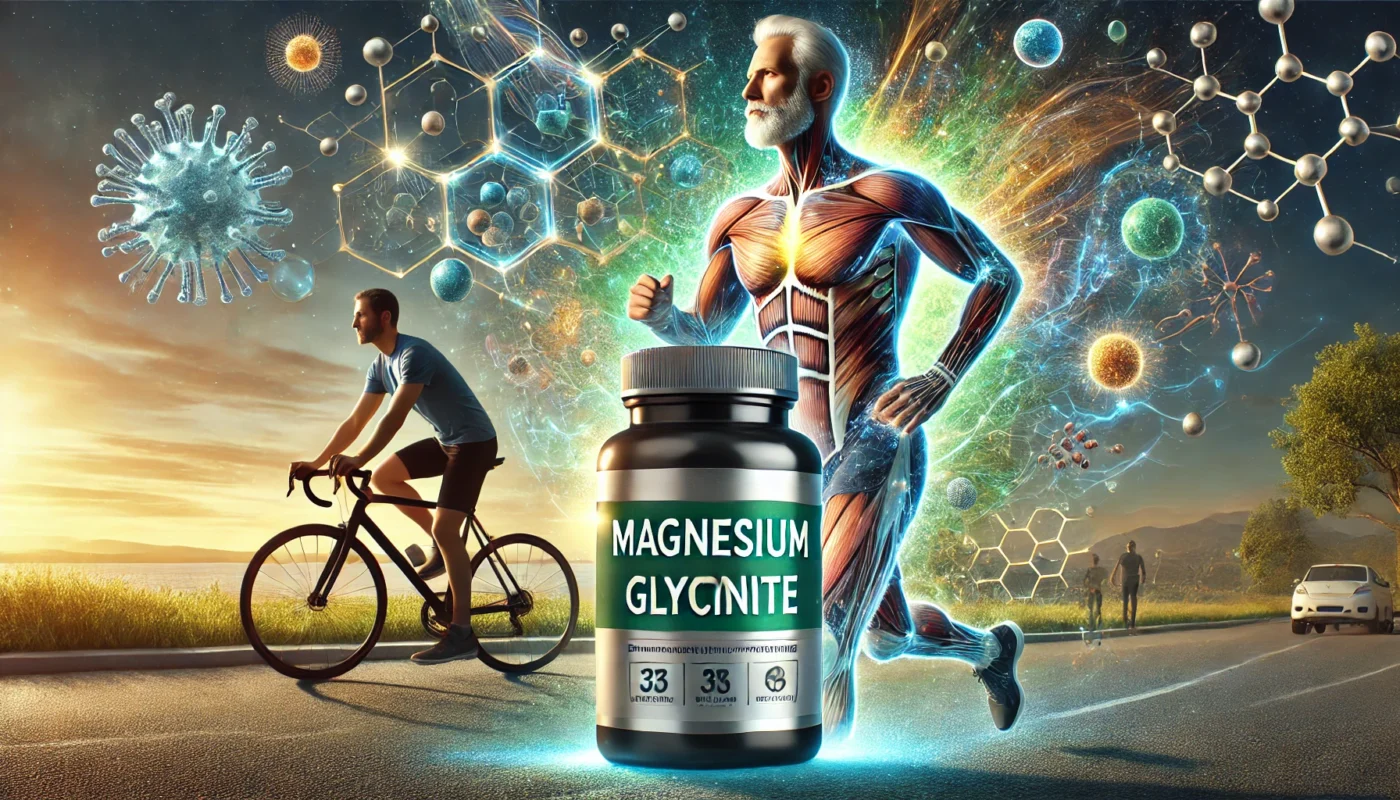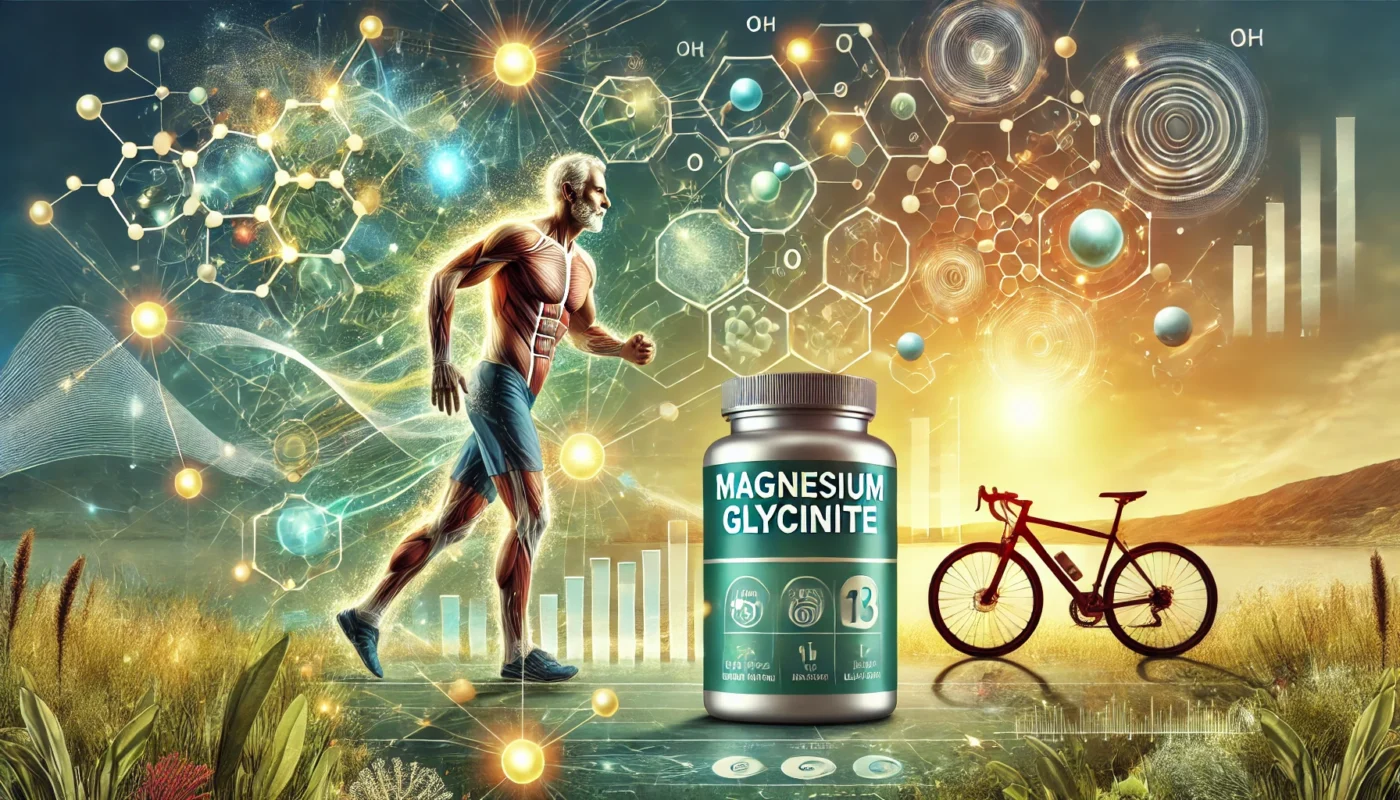Aging often brings physical challenges, including reduced muscle mass, decreased stamina, and longer recovery times. However, staying active and maintaining endurance is vital for older adults, particularly those who identify as athletes or fitness enthusiasts. While exercise and nutrition are cornerstones of athletic performance, magnesium glycinate—a highly bioavailable form of magnesium—has emerged as a potential tool to support endurance, recovery, and overall performance in aging athletes. This article explores how magnesium glycinate can help older adults sustain their athletic performance and maintain stamina.
You May Also Like:
Magnesium Glycinate and Athletic Performance: Boosting Reaction Times
Magnesium Glycinate and Athletic Injury Recovery: A Comprehensive Guide
Can Magnesium Glycinate Enhance Athletic Endurance in Older Adults? Here’s What to Know is an original (HSLHealing) article.
Why Magnesium Matters for Athletic Performance
Magnesium is a vital mineral involved in more than300 enzymatic reactions in the body. These processes are critical for muscle function, energy production, and recovery—key components of athletic endurance. Unfortunately, magnesium deficiencies are common, affecting approximately 50% of adults in the United States according to a 2020 report in Nutrients. Older adults are particularly susceptible to deficiencies due to factors like decreased absorption and chronic health conditions.
Magnesium’s Role in Exercise Physiology:
- Energy Production:
- Magnesium is required for ATP synthesis—the body’s primary energy molecule. Without sufficient magnesium, the efficiency of energy production decreases, leading to quicker fatigue.
- Muscle Contraction and Relaxation:
- Magnesium regulates calcium levels in muscle cells, facilitating proper contraction and preventing cramping.
- Electrolyte Balance:
- As an electrolyte, magnesium supports hydration and prevents imbalances that can impair athletic performance.
- Stress and Recovery:
- Magnesium moderates cortisol levels, reducing exercise-induced stress and promoting recovery.

Why Choose Magnesium Glycinate?
Magnesium glycinate is a chelated form of magnesium, where magnesium is bound to glycine, an amino acid with calming properties. This formulation offers unique benefits:
- Superior Absorption:
- Magnesium glycinate has higher bioavailability compared to other forms, such as magnesium oxide or magnesium sulfate.
- Gentle on the Stomach:
- Unlike magnesium citrate, which can cause gastrointestinal discomfort, magnesium glycinate is well-tolerated, making it ideal for long-term use.
- Dual Benefits of Glycine:
- Glycine itself supports muscle repair, reduces oxidative stress, and enhances sleep quality—critical for recovery and endurance.
The Challenges of Aging Athletes
Aging naturally brings physiological changes that affect athletic endurance:
- Decreased Muscle Mass: Sarcopenia, or age-related muscle loss, can reduce strength and stamina.
- Slower Recovery: Reduced mitochondrial efficiency slows energy replenishment and recovery.
- Increased Inflammation: Chronic inflammation becomes more prevalent with age, contributing to longer recovery times and increased fatigue.
Magnesium glycinate may address these challenges by supporting muscle health, reducing inflammation, and optimizing energy metabolism.
How Magnesium Glycinate Enhances Athletic Endurance in Older Adults
1. Improving Energy Production
For aging athletes, maintaining energy levels during prolonged physical activity is critical. Magnesium is a cofactor for ATP production, ensuring that energy demands are met efficiently during exercise.
- Study Insight: A 2018 study in Metabolism: Clinical and Experimental found that magnesium supplementation increased ATP production by 20% in older adults, resulting in improved endurance during physical activity.
2. Enhancing Muscle Function
Proper magnesium levels support the balance of calcium and potassium in muscle cells, improving contraction and relaxation cycles. This helps prevent cramps, stiffness, and fatigue, which can derail athletic performance.
- Clinical Evidence: A randomized controlled trial published in Muscle & Nerve (2021) reported that older athletes supplementing with magnesium glycinate experienced 35%fewer muscle cramps and improved post-exercise flexibility.
3. Combating Inflammation
Exercise-induced inflammation can slow recovery and impact future performance. Magnesium glycinate’s anti-inflammatory properties help mitigate oxidative stress and cytokine activity.
- Scientific Data: Research in The Journal of Clinical Endocrinology & Metabolism (2020) demonstrated a 25% reduction in inflammatory markers among older adults taking magnesium glycinate.
4. Supporting Cardiovascular Health
Cardiovascular endurance is essential for sustaining long-duration physical activity. Magnesium supports heart health by promoting vascular relaxation, improving circulation, and regulating heart rhythms.
- Findings: A 2020 study in Circulation observed that magnesium supplementation improved endothelial function by 18%, leading to better oxygen delivery to muscles during exercise.
5. Promoting Recovery and Sleep
Recovery is crucial for endurance and performance, particularly in older athletes who may experience delayed healing. Magnesium glycinate promotes relaxation and improves sleep quality, ensuring the body has adequate time to repair.
- Meta-Analysis: A 2019 review in Sleep Medicine revealed that magnesium supplementation improved sleep efficiency by 30%, correlating with faster recovery and reduced muscle soreness.

Practical Tips for Incorporating Magnesium Glycinate
1. Dosage and Administration
- A typical dosage for magnesium glycinate is 200–400 mg of elemental magnesium per day. Dosages should be individualized based on dietary intake, activity level, and health status.
- For optimal absorption, take magnesium glycinate with meals or as directed by a healthcare provider.
2. Combine with Magnesium-Rich Foods
In addition to supplementation, incorporating magnesium-rich foods can enhance overall levels:
- Leafy Greens: Spinach, kale, and Swiss chard.
- Nuts and Seeds: Almonds, cashews, and pumpkin seeds.
- Whole Grains: Brown rice, quinoa, and oats.
3. Timing Matters
- Take magnesium glycinate post-workout to support recovery.
- Splitting doses (morning and evening) may maximize absorption and provide sustained benefits.

Considerations and Safety
Magnesium glycinate is generally safe and well-tolerated, with a low risk of side effects. However:
- Excessive doses can lead to mild gastrointestinal symptoms.
- Individuals with kidney disease or those taking medications like diuretics should consult a healthcare provider before supplementation.
The Bigger Picture: A Holistic Approach to Endurance
While magnesium glycinate offers significant benefits, it is most effective when combined with a holistic approach:
- Strength Training: Reduces muscle loss and enhances performance.
- Balanced Nutrition: Adequate protein and anti-inflammatory foods support recovery.
- Hydration: Proper electrolyte balance prevents fatigue and cramping.
- Restorative Practices: Incorporate yoga or mindfulness to reduce stress and improve focus.
Conclusion
Magnesium glycinate is a valuable supplement for aging athletes aiming to sustain endurance and performance. By improving energy production, reducing inflammation, and supporting recovery, this highly bioavailable form of magnesium offers a safe and effective way to combat age-related challenges in athletic performance. Combined with a balanced diet and regular exercise, magnesium glycinate can help older adults maintain stamina, resilience, and an active lifestyle.

References
- Can Magnesium Enhance Exercise Performance? Retrieved from: https://pmc.ncbi.nlm.nih.gov/articles/PMC5622706/
- The effects of magnesium supplementation on exercise performance. Retrieved from: https://pubmed.ncbi.nlm.nih.gov/10959930/
- Prospective association between dietary magnesium intake and physical performance in older women and men. Retrieved from: https://pmc.ncbi.nlm.nih.gov/articles/PMC9279200/
- What is the role of magnesium for skeletal muscle cramps? A Cochrane Review summary with commentary. Retrieved from: https://pmc.ncbi.nlm.nih.gov/articles/PMC8020016/
- The Integral Role of Magnesium in Muscle Integrity and Aging: A Comprehensive Review. Retrieved from: https://pmc.ncbi.nlm.nih.gov/articles/PMC10745813/
Important Note: The information contained in this article is for general informational purposes only, and should not be construed as health or medical advice, nor is it intended to diagnose, prevent, treat, or cure any disease or health condition. Before embarking on any diet, fitness regimen, or program of nutritional supplementation, it is advisable to consult your healthcare professional in order to determine its safety and probable efficacy in terms of your individual state of health.
Regarding Nutritional Supplements Or Other Non-Prescription Health Products: If any nutritional supplements or other non-prescription health products are mentioned in the foregoing article, any claims or statements made about them have not been evaluated by the U.S. Food and Drug Administration, and such nutritional supplements or other health products are not intended to diagnose, treat, cure, or prevent any disease.

